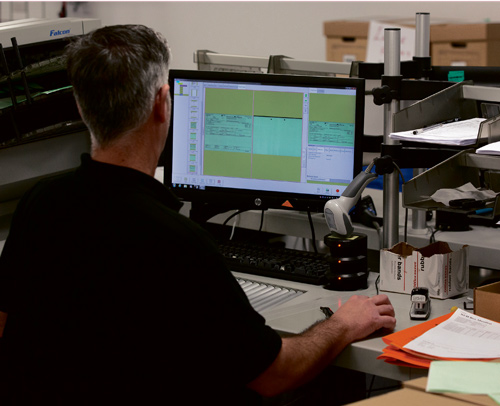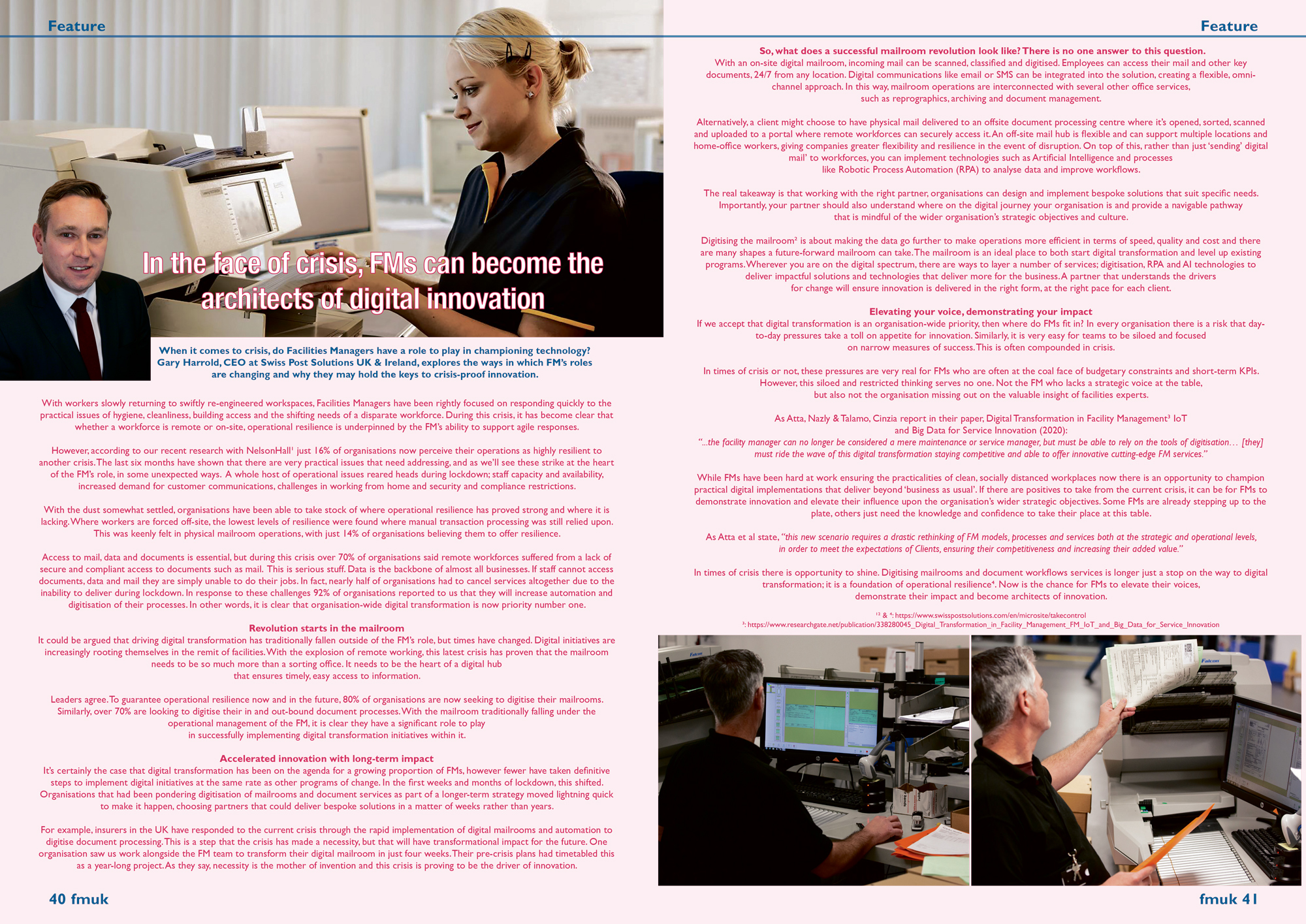In The Face Of Crisis, FMs Can Become The Architects Of Digital Innovation
 When it comes to crisis, do Facilities Managers have a role to play in championing technology? Gary Harrold, CEO at Swiss Post Solutions UK & Ireland explores the ways in which FM’s roles are changing and why they may hold the keys to crisis-proof innovation.
When it comes to crisis, do Facilities Managers have a role to play in championing technology? Gary Harrold, CEO at Swiss Post Solutions UK & Ireland explores the ways in which FM’s roles are changing and why they may hold the keys to crisis-proof innovation.
With workers slowly returning to swiftly re-engineered workspaces, Facilities Managers have been rightly focused on responding quickly to the practical issues of hygiene, cleanliness, building access and the shifting needs of a disparate workforce. During this crisis, it has become clear that whether a workforce is remote or on-site, operational resilience is underpinned by the FM’s ability to support agile responses.
However, according to our recent research with NelsonHall just 16% of organisations now perceive their operations as highly resilient to another crisis. The last six months have shown that there are very practical issues that need addressing, and as we’ll see these strike at the heart of the FM’s role, in some unexpected ways.
A whole host of operational issues reared heads during lockdown; staff capacity and availability, increased demand for customer communications, challenges in working from home and security and compliance restrictions.
With the dust somewhat settled, organisations have been able to take stock of where operational resilience has proved strong and where it is lacking. Where workers are forced off-site, the lowest levels of resilience were found where manual transaction processing was still relied upon. This was keenly felt in physical mailroom operations, with just 14% of organisations believing them to offer resilience.
Access to mail, data and documents is essential, but during this crisis over 70% of organisations said remote workforces suffered from a lack of secure and compliant access to documents such as mail.
This is serious stuff. Data is the backbone of almost all businesses. If staff cannot access documents, data and mail they are simply unable to do their jobs. In fact, nearly half of organisations had to cancel services altogether due to the inability to deliver during lockdown.
In response to these challenges 92% of organisations reported to us that they will increase automation and digitisation of their processes. In other words, it is clear that organisation-wide digital transformation is now priority number one.
Revolution starts in the mailroom
It could be argued that driving digital transformation has traditionally fallen outside of the FM’s role, but times have changed. Digital initiatives are increasingly rooting themselves in the remit of facilities. With the explosion of remote working, this latest crisis has proven that the mailroom needs to be so much more than a sorting office. It needs to be the heart of a digital hub that ensures timely, easy access to information.
Leaders agree. To guarantee operational resilience now and in the future, 80% of organisations are now seeking to digitise their mailrooms. Similarly, over 70% are looking to digitise their in and out-bound document processes. With the mailroom traditionally falling under the operational management of the FM, it is clear they have a significant role to play in successfully implementing digital transformation initiatives within it.
Accelerated innovation with long-term impact
It’s certainly the case that digital transformation has been on the agenda for a growing proportion of FMs, however fewer have taken definitive steps to implement digital initiatives at the same rate as other programs of change. In the first weeks and months of lockdown, this shifted. Organisations that had been pondering digitisation of mailrooms and document services as part of a longer-term strategy moved lightning quick to make it happen, choosing partners that could deliver bespoke solutions in a matter of weeks rather than years.
For example, insurers in the UK have responded to the current crisis through the rapid implementation of digital mailrooms and automation to digitise document processing. This is a step that the crisis has made a necessity, but that will have transformational impact for the future. One organisation saw us work alongside the FM team to transform their digital mailroom in just four weeks. Their pre-crisis plans had timetabled this as a year-long project. As they say, necessity is the mother of invention and this crisis is proving to be the driver of innovation.
So, what does a successful mailroom revolution look like? There is no one answer to this question.
With an on-site digital mailroom, incoming mail can be scanned, classified and digitised. Employees can access their mail and other key documents, 24/7 from any location. Digital communications like email or SMS can be integrated into the solution, creating a flexible, omni-channel approach. In this way, mailroom operations are interconnected with several other office services, such as reprographics, archiving and document management.
Alternatively, a client might choose to have physical mail delivered to an offsite document processing centre where it’s opened, sorted, scanned and uploaded to a portal where remote workforces can securely access it. An off-site mail hub is flexible and can support multiple locations and home-office workers, giving companies greater flexibility and resilience in the event of disruption. On top of this, rather than just ‘sending’ digital mail’ to workforces, you can implement technologies such as Artificial Intelligence and processes like as Robotic Process Automation (RPA) to analyse data and improve workflows.
The real takeaway is that working with the right partner, organisations can design and implement bespoke solutions that suit specific needs. Importantly, your partner should also understand where on the digital journey your organisation is and provide a navigable pathway that is mindful of the wider organisation’s strategic objectives and culture.
Digitising the mailroom is about making the data go further to make operations more efficient in terms of speed, quality and cost and there are many shapes a future-forward mailroom can take. The mailroom is an ideal place to both start digital transformation and level up existing programs. Wherever you are on the digital spectrum, there are ways to layer a number of services; digitisation, RPA and AI technologies to deliver impactful solutions and technologies that deliver more for the business. A partner that understands the drivers for change will ensure innovation is delivered in the right form, at the right pace for each client.
Elevating your voice, demonstrating your impact
If we accept that digital transformation is an organisation-wide priority, then where do FMs fit in? In every organisation there is a risk that day-to-day pressures take a toll on appetite for innovation. Similarly, it is very easy for teams to be siloed and focused on narrow measures of success. This is often compounded in crisis.
In times of crisis or not, these pressures are very real for FMs who are often at the coal face of budgetary constraints and short-term KPIs. However, this siloed and restricted thinking serves no one. Not the FM who lacks a strategic voice at the table, but also not the organisation missing out on the valuable insight of facilities experts.
As Atta, Nazly & Talamo, Cinzia report in their paper, Digital Transformation in Facility Management IoT and Big Data for Service Innovation (2020):
“...the facility manager can no longer be considered a mere maintenance or service manager, but must be able to rely on the tools of digitisation… [they] must ride the wave of this digital transformation staying competitive and able to offer innovative cutting-edge FM services.”
While FMs have been hard at work ensuring the practicalities of clean, socially distanced workplaces now there is an opportunity to champion practical digital implementations that deliver beyond ‘business as usual’. If there are positives to take from the current crisis, it can be for FMs to demonstrate innovation and elevate their influence upon the organisation’s wider strategic objectives. Some FMs are already stepping up to the plate, others just need the knowledge and confidence to take their place at this table.
As Atta et al state, “this new scenario requires a drastic rethinking of FM models, processes and services both at the strategic and operational levels, in order to meet the expectations of Clients, ensuring their competitiveness and increasing their added value.”
In times of crisis there is opportunity to shine. Digitising mailrooms and document workflows services is longer just a stop on the way to digital transformation; it is a foundation of operational resilience. Now is the chance for FMs to elevate their voices, demonstrate their impact and become architects of innovation.
Click the article to enlarge it.
























































